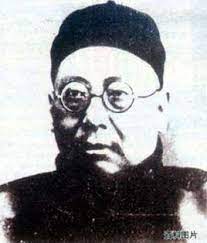Huang Chieh (1874-January 1935), poet, scholar known for his studies of the Six Dynasties period, and teacher. Although he was one of the founders of the Xan-she (1908;, he preferred the Sung style to that of T'ang. A native of Shunte, Kwangtung, Huang Chieh received his early classical training from Chien Ch'ao-liang, a disciple of the renowned Cantonese scholar Chu Tz'u-ch'i, and distinguished himself as a student at the Kuang-ya Academy in Canton. Because the possibility of China's being partitioned after the Boxer Uprising worried him, Huang left Kwangtung for Shanghai, where, together with Teng Shih and Liu Shih-p'ei (q.v.) he founded in 1905 the Kuo-hsueh pao-ts'un-hui [association for the preservation of classical Chinese learning], to which he contributed money and 4,000 books and for which he made special efforts to find books outlawed by the Ch'ing government. He wrote many articles for the journal Kuo-ts'ui hsueh-pao [national essence]. In addition, he was one of the founders of the Nan-she [the southern association], established in Soochow in 1908, which was supported by a group of prominent poets with strong nationalist sentiments.
In the early years of the republican era, Huang Chieh returned to Kwangtung as director of Provincial High College, but he soon left for north China to teach at National Peking University. When Yuan Shih-k'ai was about to proclaim himself monarch, Huang left Peking for Kwangtung, where he served briefly as provincial minister of education. He advocated a coeducational system, but this reform proved premature. Consequently, he resigned and returned to his teaching position in Peking. By happy coincidence, two girl students were admitted to National Peking University in February 1920. This innovation was adopted by Kwangtung public schools in 1921.
Huang Chieh is best remembered as a poet. He preferred the Sung style to that of T'ang, and he had highest regard for the elegant style ofCh'enShih-tao (1053-1101) and for the work of Ku Yen-wu (ECCP, I, 421-26). In this particular respect he differed from his cofounders of the Nan-she, most of whom were faithful followers of Kung Tzu-chen (ECCP, I, 431-34). Huang's collected poems were published as Chien-chia-lou shih. The majority of the poems were first published in chronological sequence in the Hsueh-heng [critical review]. Huang is also known for his studies of the poetry of the Six Dynasties period. He annotated and collated the poetic works of Ts'ao Ts'ao (150-220), Ts'ao P'ei (190-252), and Ts'ao Jui (205-239) in Wei Wen-Wu-Ming-ti shih chu. He performed similar labors for Juan Chi (210-263) in Juan Pu-ping yu'ng-huai-shih chu, Hsieh Ling-yün (385-433) in Hsieh K'ang-lo shih chu, and Pao Chao (421-465) in Pao Ts'an-chün shih chu. In addition, Huang selected and collated popular songs of the Han-Wei period (206 B.C.-265 A.D.) in his Han-Wei yüeh-fu feng chien. Huang Chieh died in Peiping in January 1935.

黄节
原名:黄佩文
字:晦闻
黄节(1874—1935。1)诗人,以研究六朝诗闻名的学者,教师。“南社”创始人之一。
黄节,广东顺德人。幼年时就学于广东名学者朱子奇的门人简朝亮,是广州广雅书院一名优等生。义和国运动之后,中国有被瓜分的危险,黄节离广州去上海,1905年和邓实、刘师培等人组织了一个“国学保存会”
,黄节对该会捐款并赠书四千册,并为该会捜寻清廷禁书做出特别努力。他在《国粹学报》上写了不少文章。此外,他又是1908年在苏州成立的“南社”的创始人之一,该社得到一些具有强烈民族主义思想的著名诗人的支持。
民国初年,黄节回广东任省立高等师范监督,但不久即到北方在北京大学教书。袁世凯准备称帝的时候,他离北京回广东,在南方暂任教育厅长。他提倡男女同校制度,但这一改革在当时尚不能为人接受。他辞职后又回北京教书,
1920年2月,出于巧合,北京大学招收了两名女学生。这一革新在1921年就在广东各校推行开了。
黄节是作为一名诗人而被人怀念。他喜爱宋诗胜于唐诗。他对陈师道(1053—1101)的优美风格和顾炎武的作品很赞赏。在这方面,他与“南社”的其它创始人有所不同,他们大多是龚自珍的忠实追随者。黄节的诗已编成《兼葭楼诗》。他的诗大多按时间先后在《学衡》上发表。黄节对六朝诗的研究很闻名,他编注了曹植、曹丕、曹叡的诗集《魏文、武、明帝诗注》,他又致力于阮籍、谢灵运的著作,编有《阮步兵咏怀诗注》和《谢康乐诗注》,此外又编了汉魏民歌《汉魏乐府风笺》。
黄节于1935年1月死在北京。